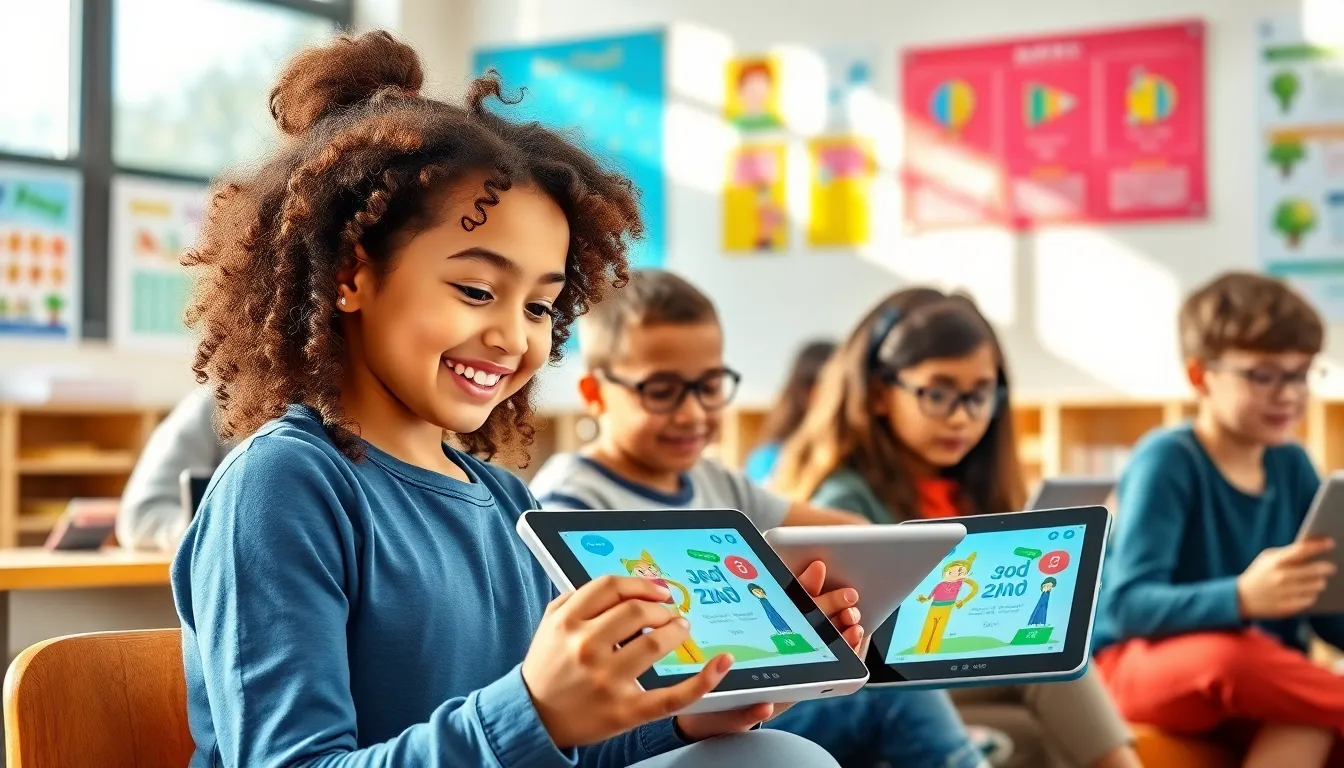In a world where learning can sometimes feel like deciphering ancient hieroglyphics, adaptive learning apps swoop in like superheroes, ready to save the day. These innovative tools tailor educational experiences to individual needs, making studying feel less like a chore and more like a personalized adventure. Imagine having a tutor who knows exactly what you struggle with—no awkward small talk required.
Gone are the days of one-size-fits-all education. With adaptive learning apps, learning becomes as unique as the person using it. Whether you’re a math whiz or a history buff, these apps adjust to your pace and style, ensuring you’re always one step ahead. So why not embrace the future of learning and let technology do the heavy lifting? After all, who wouldn’t want to learn smarter, not harder?
Table of Contents
ToggleOverview Of Adaptive Learning Apps
Adaptive learning apps represent a paradigm shift in education, allowing personalized learning experiences. These applications analyze user interactions and performance data, adjusting content according to individual needs. Learning becomes more engaging through tailored materials that respond in real-time.
User progress tracking enhances motivation. When learners see their advancement, they feel empowered to continue. Features such as quizzes and assessments help reinforce the learning material, ensuring comprehension.
A variety of subjects are supported by adaptive learning apps, ranging from mathematics to language arts. Access to diverse resources makes it easier for students to find motivation in their studies. Furthermore, these apps often employ gamification elements to make learning enjoyable.
Real-time feedback offers valuable insights into strengths and areas for improvement. Users receive instant updates on their performance, promoting self-regulated learning. The flexibility of learning environments allows students to engage at their preferred pace, whether in classrooms or at home.
Cost-effectiveness represents another benefit of these innovative tools. Many adaptive learning apps cost less than traditional tutoring services, providing accessible options for various learners.
Embracing technology in education fosters an inclusive atmosphere. Adaptive learning apps cater to diverse learning styles and abilities, ensuring everyone has the opportunity to succeed. As these tools continue evolving, they will likely play an increasingly vital role in modern education.
Key Features Of Adaptive Learning Apps

Adaptive learning apps integrate various features that enhance educational experiences. Personalization techniques and data-driven insights stand out as critical components in these applications.
Personalization Techniques
Customized learning paths align content with individual user needs. Tailoring resources based on students’ strengths and weaknesses ensures targeted support. Dynamic assessments adjust difficulty levels, allowing learners to progress at their own pace. Content personalization fosters engagement by presenting materials in preferred formats. Flexibility in learning styles accommodates diverse preferences, enhancing comprehension and retention.
Data-Driven Insights
Analytics play a vital role in refining educational content. User interactions yield valuable metrics that inform adaptations. Continuous feedback helps identify learning trends, optimizing teaching strategies. Performance data guides adjustments in real time, addressing the unique challenges each learner faces. Informed decisions based on insights promote effective learning environments, enhancing overall educational outcomes.
Benefits Of Using Adaptive Learning Apps
Adaptive learning apps offer significant advantages for learners by tailoring experiences to individual needs. These tools revolutionize education by focusing on personalization and effectiveness.
Improved Learning Outcomes
Data shows that adaptive learning apps enhance student performance. Users often demonstrate mastery of concepts faster due to customized content. Immediate feedback helps identify and address knowledge gaps, promoting retention. Regular assessments adjust difficulty levels, ensuring that students face appropriate challenges. Furthermore, users can set and achieve specific learning goals, which boosts motivation and confidence in their capabilities.
Enhanced Engagement
Adaptive learning apps increase engagement through interactive features. Gamification keeps students interested by incorporating elements like rewards and challenges. Personalized experiences foster a sense of ownership over learning, enabling users to explore subjects at their own pace. Real-time data tracking also allows students to visualize their progress, making learning objectives tangible. Notably, the flexibility of these apps accommodates diverse learning styles, making education more accessible and enjoyable.
Popular Adaptive Learning Apps
Adaptive learning apps have gained popularity for their ability to enhance the educational experience. They offer personalized learning solutions by analyzing user performance and adjusting content accordingly.
App 1: Overview And Features
Knewton provides personalized learning experiences by adapting content to each student’s needs. This app uses algorithms to analyze performance, offering real-time feedback to sharpen mastery of concepts. Interactive elements hold users’ attention while gamified features foster engagement. Knewton supports various subjects, making it versatile for different learners. Comprehensive analytics enable educators to monitor progress and tailor instructional strategies. Integration with other educational platforms further enhances its usability. Data-driven insights empower users, ensuring an effective learning path.
App 2: Overview And Features
DreamBox Learning delivers individualized math instruction through adaptive technology. The app assesses student understanding and modifies challenges in real-time, promoting skill mastery. Engaging visuals and interactive lessons create a dynamic learning atmosphere. Teachers can track progress through detailed reports, allowing for informed instructional decisions. DreamBox’s unique approach accommodates diverse learning styles, ensuring inclusivity. With a focus on critical thinking and problem-solving, this app prepares students for future academic challenges. Continuous updates keep content fresh and relevant, enhancing the overall learning experience.
Challenges And Considerations
Adaptive learning apps present unique challenges and considerations that users must navigate. Data privacy concerns arise as these applications collect sensitive user information. Ensuring compliance with regulations like FERPA and GDPR becomes essential for developers and users alike.
Equally important, equity in access poses a significant challenge. Not all students have the same access to technology or the internet, potentially widening the achievement gap. Developers must prioritize creating solutions that are accessible on various devices and platforms.
User engagement remains another crucial factor. While adaptive learning apps can enhance motivation, users may lose interest without effective gamification elements. Balancing educational content with engaging features drives sustained interaction with the app.
Content quality is paramount as well. Relying on algorithms may inadvertently produce gaps in the curriculum. Involving educators in the development process ensures content meets established educational standards and effectively addresses learning objectives.
Training for educators and students often requires additional resources. Professional development for teachers ensures they can integrate these tools effectively into their classrooms. Clear instructions and support materials for students help them maximize the potential of the apps.
Feedback mechanisms play a crucial role in continuous improvement. Providing users with real-time analytics supports their personalized learning paths. Regular updates respond to user interactions and adapt content as necessary, improving overall effectiveness.
Managing screen time is another significant consideration. With increased reliance on digital tools, finding the right balance becomes essential to promote healthy habits. Encouraging breaks and interaction with non-digital learning experiences supports holistic development.
These challenges necessitate careful planning and user-centered design, ensuring adaptive learning apps effectively enhance education while addressing potential pitfalls.
Adaptive learning apps are revolutionizing the educational landscape by offering personalized learning experiences that cater to individual needs. These tools not only enhance engagement but also promote mastery of concepts through tailored content and real-time feedback. As they continue to evolve they hold great promise for making education more inclusive and accessible.
While challenges such as data privacy and equitable access remain, the potential benefits of adaptive learning apps far outweigh the drawbacks. With careful planning and user-centered design these innovative solutions can significantly improve educational outcomes. Embracing this technology empowers learners to take control of their educational journeys and fosters a more dynamic learning environment.



